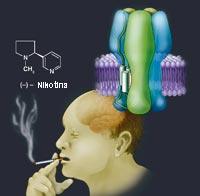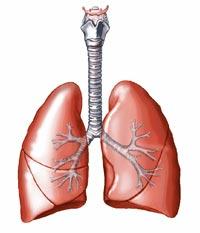Smoke in the lungs, nicotine in the brain

Despite the contrary measures, tobacco is a visible and everyday element in most social areas, at home and on the street, in school and in business, in the space of leisure and work, in the hospital and in prison, accessible to everyone and marketed in eleven places.
Come on! And what is then the main responsible for this close link? That is, what generates that need? Tobacco smoke is a complex mix of thousands of compounds, but nicotine is responsible for the most immediate effects on the smoker's body and, at the same time, dependence on both the brain and behavior. To understand nicotine dependence it is necessary to know how it behaves in the brain.
Nicotine (C 10 H 14 N 2) is a liquid alkaloid. And alkaloids are organic compounds formed by carbon, hydrogen, nitrogen and sometimes oxygen. These chemical compounds have violent effects on the human body.

Nicotine generates great dependence. Stimulant and sedative of the central nervous system. The consequences of nicotine disappear in a few minutes, so the smoker needs to take them often throughout the day to maintain the pleasure of the drug and avoid the consequences of withdrawal. Stimulating and relaxing. How is it possible? Although it seems paradoxical, nicotine ignites the smoker and at the same time calms, how often and how often it burns. It can be said that the same thing happens with alcohol. With the first tragedy we all feel satisfied, but when we drink abusively the comogations occur.
Sometimes people do not realize that the nicotine obtaining system is very effective and mechanized. The smoker can quickly take nicotine to the brain with each inhalation. The regular smoker gives 10 shots to the cigarette for 5 minutes (time of stay of the cigarette). Therefore, one and a half packs a day (30 cigarettes) give the brain 300 daily doses of nicotine. This form of tobacco use reinforces the intrinsic ability of nicotine to create great dependence.

Each cigar contains about 8-20 mg of nicotine, and the smoker breathes on average one milligram of nicotine for each cigar he smokes. This is the most direct way of penetration of nicotine into the body, inhalation.
The lungs are made up of millions of alveoli in which gas exchange occurs. This facilitates the introduction of nicotine and other compounds. Nicotine passes quickly from the blood to the brain, from where it causes the stimulating and sedative effects of the body.
Neurons organize brain information and the latter are communicated by neurotransmitters. Each neurotransmitter has its own family of receptors. And in the case of nicotine we talk about acetylcholine. This receptor is the one that directs the signal from the brain to the muscles, it is the one that controls the basic functions (energy level, heart pulsations...) and has great importance in the learning process and in memory, among others.
It also has advantages

However, nicotine reinforces other psychological functions of weight and real benefit to the smoker. For example, it improves concentration and accuracy in boring jobs that require a lot of attention for a long time. It can improve some aspects of the learning process and memory, and it can even stimulate the ability to process information quickly.
In this sense, we have studied the possibility of using nicotine to solve memory problems and study in dementias such as Alzheimer's disease. Researchers have found that nicotine prevents the accumulation of beta amyloid proteins.
This protein especially attacks the brain of Alzheimer's patients and can take various forms. Nicotine binds to the amyloid beta protein and prevents the accumulation of the form that appears in the brains of Alzheimer's patients. Therefore, nicotine can be used in the future to cure Alzheimer's disease. However, not all the research that has been done on the subject coincides.
On the other hand, nicotine can improve the quality of life of patients with Tourette syndrome. People with Tourette syndrome have tiks of words and muscles that shake the head and some parts of the body uncontrollably. To combat this syndrome, small doses of antipsychotic drugs are administered, with serious side effects such as dizziness, headache and dehydration. A few years ago experts found that small doses of nicotine stopped those doses. That is, skipping all these medications and introducing some nicotine into daily food and drink, the problem can be largely solved. Incidentally, nicotine side effects would be lower. Of course, we're not talking about tobacco! The next step for researchers would be to eliminate these side effects.
Not only nicotine

In addition to nicotine, cigarette smoke consists of tar and a dozen gases (mainly carbon monoxide). The common cigarette contains about 15 mg tar and tar cigarette under 7 mg. Tobacco tar makes the smoker highly likely to develop lung cancer, emphysema, or bronchial problems. Carbon monoxide from smoke increases the risk of cardiovascular disease. Carbon monoxide is fixed in hemoglobin and reduces blood oxygenation capacity.
Over two hundred years ago, the relationship between tobacco and the onset of cancer was first mentioned. And since then all this has been consolidated year after year. Research on this issue is also ongoing.
Josep Manuel Piera: “No one doubts that tobacco and cancer are related”
For starters, what kind of cancer does tobacco cause?
These include lung, bladder, oral cavity, larynx, pharynx, sinuses, esophagus, stomach, pancreas, liver, and kidney. All of them would be avoided by quitting smoking.

And do these have differential characteristics compared to other cancers?
Well, especially burning cancers have nothing to do with it. Tobacco is responsible for many tumors but does not influence its evolution. Therefore, lung cancer behaves in both smokers and non-smokers. The differences between tumors depend primarily on the organ in which they originate.
Even at the molecular level, how do you explain the influence of tobacco on the genesis of cancer?
As we know, DNA is made up of four basic bases. Any abnormal changes in the order of this sequence of bases can result in an abnormal protein. This, in turn, can encode an abnormal cell function, such as cell growth or proliferation. Therefore, if this mutation affects the protein that regulates cell growth, potentially harmful cells can grow uncontrollably. And then cancer. All this is due to carcinogenic tobacco compounds that stick to DNA, since tobacco smoke contains more than 20 carcinogens.
How much do we know about all this? That is, at what level of knowledge do we find ourselves?
No one doubts that tobacco and cancer are largely related, in that knowledge we are very advanced. Not so in the protective measures to be adopted. However, it should be noted that important steps have been taken in recent years to reduce smoking at both governmental and international levels. For example, smoking is prohibited in public places, hospitals, etc.
In addition, a special effort must be made with young people not to start smoking.
Is cigarette combined with another substance more harmful?
Combustion causes cancer. And in some cases, when combined with other substances, it increases these possibilities. Without going any further, alcohol is one of these substances. In fact, cases of pharyngeal and esophageal cancer increase considerably when a combination of tobacco and alcohol occurs. Esophageal cancer, in particular, is closely related to the combination of both compounds. We talk about smokers who drink a lot of alcohol. In contrast, lung cancer is only related to tobacco. We cannot forget the concept of passive smokers... No, of course. If there are smokers around a nonsmoker, the likelihood of developing cancer is greater than if there are no smokers around them, no doubt. This is evidenced by data from the IARC (International Agency for Research on Cancer). It depends on smoke concentration and exposure time. But this risk exists and ranges from approximately 12% to 30%.
The passive smoker breathes air with tobacco smoke. Therefore, the passive smoker, although unconsciously, breathes both carcinogenic and toxic compounds that the smoker emits into the air. It is evident, therefore, that inhaling the fumes of the surrounding cigarettes produces lung cancer in humans.
What do doctors think of the measures being taken in society on tobacco?
If we consider that tobacco or smoking is harmful, I think the measures are positive. Earned in health. However, like everything, I think we have to do it well and with respect, and not directly with violent campaigns and without measures against the smoker. After all, smokers are people who started smoking in their day, and it is possible that they have ever thought about quitting that habit and have not been achieved, or not, who knows. Ideally, help dependents.





